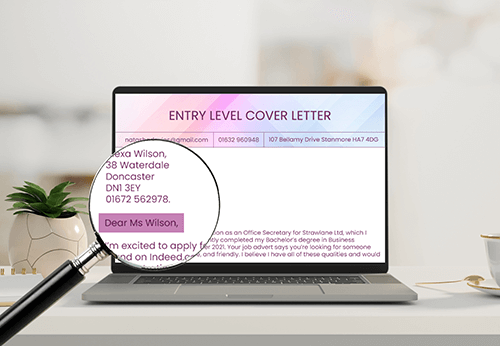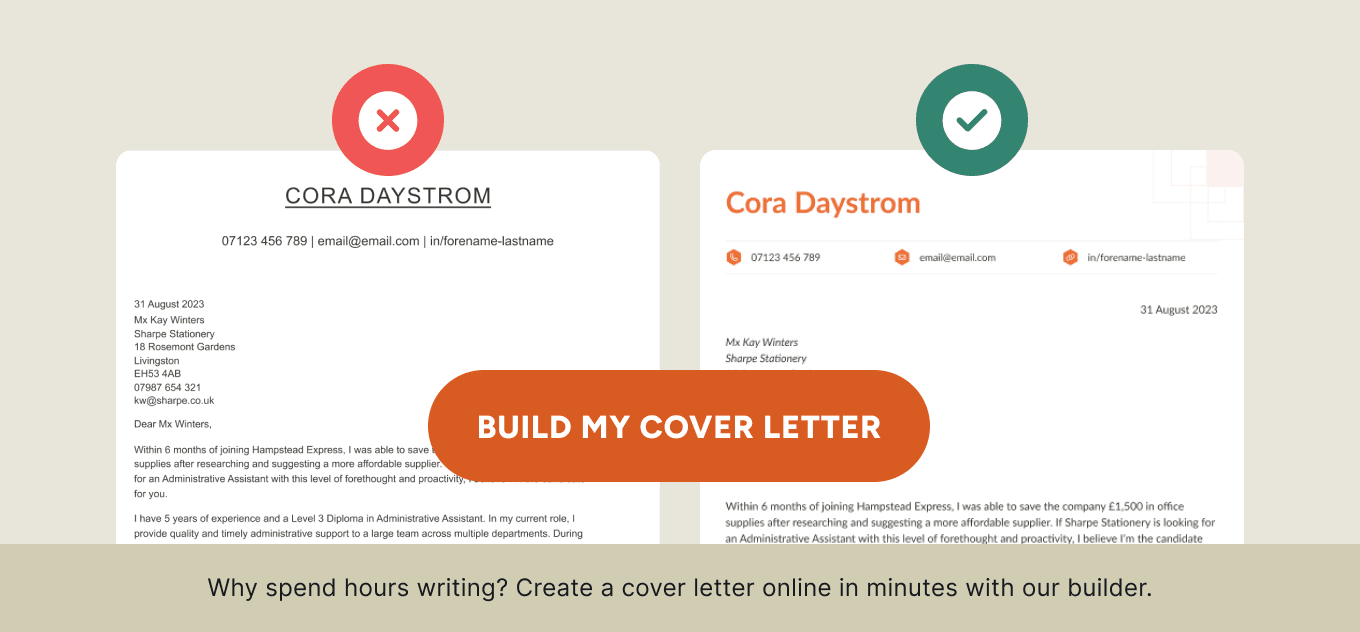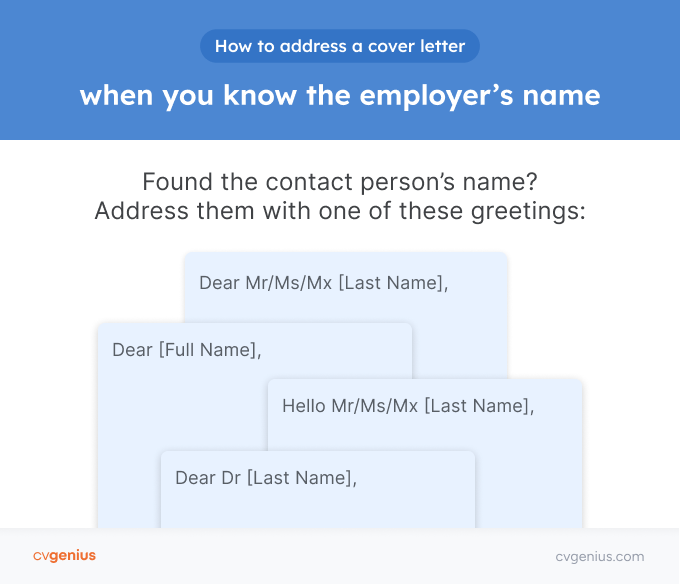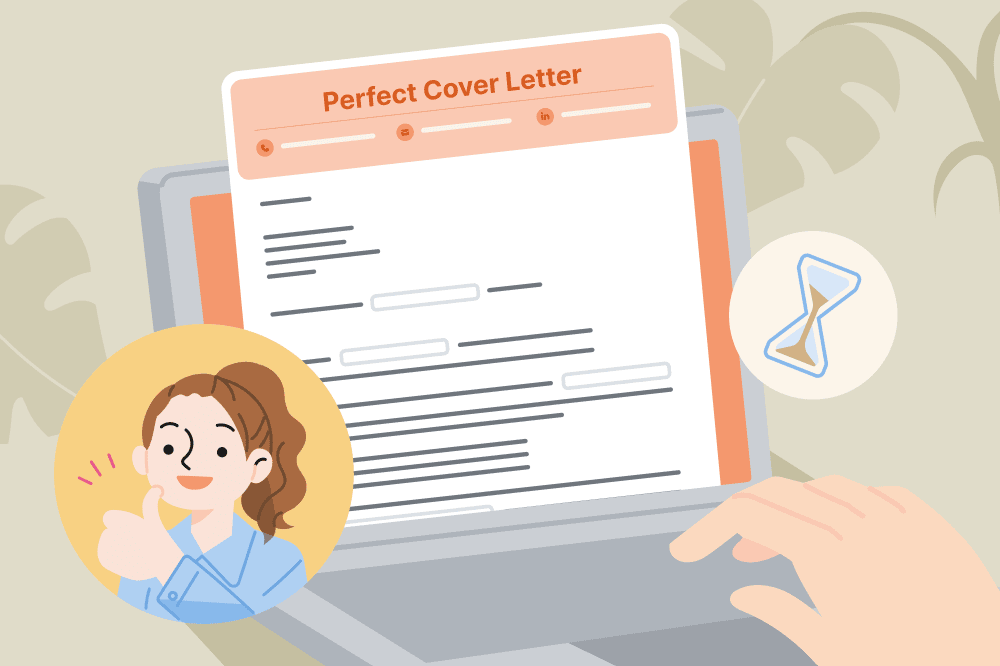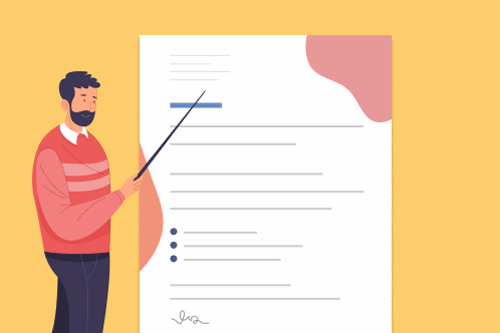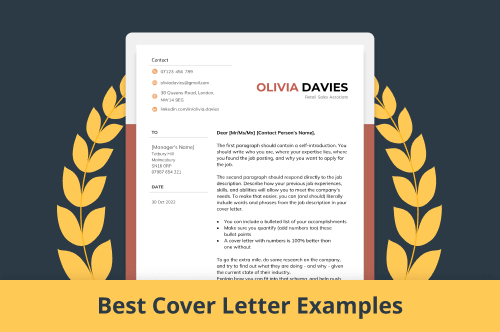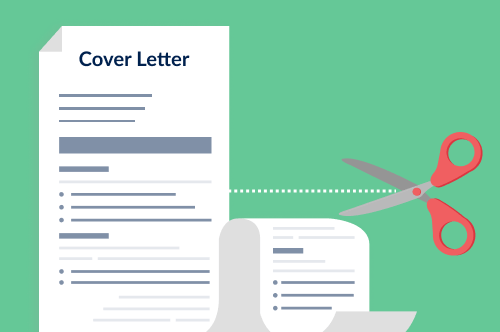How to address your cover letter is one of the first things you have to consider when you format your job application letter — and this is generally how to do it in the UK:
Dear [Contact Person’s Name], (e.g., ‘Dear Mr Benson,’)
You should never use generic greetings like ‘To Whom It May Concern’ or ‘Dear Sir/Madam’ as they make you appear impersonal. But there are various job application situations you might encounter that require a non-standard greeting like the one above, depending on whether you:
1. If you have a contact’s name
Know the contact person’s name, gender, and title (e.g., Sir/Dame, Rev., Prof.)? Then personalise your cover letter greeting by using that information.
Here are some ways to address a cover letter that are suitable for most situations:
- Dear Mr/Ms/Mx [Last Name],
- Dear [Full Name],
- Dear Dr [Last Name],
- Hello Mr/Ms/Mx [Last Name], (but note that ‘Hello’ is only appropriate if you know the person)
If you’re unsure what the person’s gender or title is, do a little research on their social media (LinkedIn is a great source) or company website.
And if you still can’t figure out what title to use, addressing your cover letter ‘Dear [Full Name],’ is an appropriate solution.
2. If you don’t have a contact’s name
When you don’t have the name of a person to address in your cover letter, the first thing you need to do is search for one. Addressing a specific person is always your best option, as doing so helps you establish a personal connection with the company.
In most cases, you’ll be able to find the right person by checking the following sources:
- The company’s ‘About Us’ page: You’ll often be able to find employees and their job titles listed on the company website.
- LinkedIn: Search the company and use the ‘People’ tab to access a list of people associated with the company. Then use terms like ‘marketing’, ‘human resources’, or ‘manager’ to narrow your search.
- Google: Use search operators (targeted search terms) to broaden or define your search. Putting a job title in double quotation marks (e.g., “press officer”) will prompt Google to search for that exact phrase, while “site:[company website] [job title]” will return matching results from the company website.
Alternatively, contact the company directly by phone or email. Reaching out to a potential employer might be intimidating, but taking this personalised approach will show them you’re enthusiastic about the opportunity — and make your application more noticeable.
But what if, despite your best efforts, you still can’t find a contact person?
If you really can’t find a name, you can still write a cover letter that’s personalised to the employer by addressing them by their department:
Addressing a contact person by their department
- Dear Accounting Department,
- Dear Human Resources Director,
- Dear Apple Marketing Team,
- Dear Head of Public Relations,
- Dear Human Resources Manager,
If you’re unsure of the contact person’s department, use ‘Dear Recruitment Manager,’. It’s impersonal, but it gets the job done.
Frequently asked questions about how to address a cover letter
Below we answer five questions commonly asked about how to address a cover letter for a job:
- How do you address an email cover letter?
- What is a warm salutation?
- Should you say ‘I look forward to hearing from you’ in a cover letter?
- How do I format the addresses on my cover letter?
- How do I address a cover letter to a recruitment agency?
1. How do you address an email cover letter?
You address an email cover letter as you would a physical cover letter. Use a formal full-name greeting or a formal salutation followed by the contact person’s last name. Or, if you can’t find a person to address, use the department name or a job title.
Here are a few examples:
- Dear Joanna Parks,
- Dear Ms Wells,
- Dear Mr Riddley,
- Dear Dr Blake,
- Dear Tesco Marketing Team,
- Dear HR Manager,
2. What is a warm salutation?
A warm salutation is one that:
- starts with ‘Dear’
- addresses the contact person by name
Here’s an example of a warm salutation followed by a cold one you should avoid using wherever possible:
Warm salutation
Dear Ms Kryzgalia,
Cold salutation
To Whom It May Concern,
3. Should you say ‘I look forward to hearing from you’ in a cover letter?
Yes, you can say ‘I look forward to hearing from you’ in your cover letter. Employers expect to see a call-to-action like this at the end of your cover letter, as it demonstrates your genuine interest in the role.
But if you want to avoid using this common phrase, here are some alternatives:
- I’m excited to hear back from you soon
- Awaiting your kind response at your earliest convenience
- Anticipating your reply
And remember to include your email address and phone number when you use this phrase. Even though this information should be in your cover letter header, repeating it in your closing paragraph ensures it’s easy for the employer to find.
4. How do I format the addresses on my cover letter?
Here’s how to put your address and the company’s address on your cover letter:
- Single space and right-align your contact information, putting your name, street number and name, town, and postcode each on their own line
- Add today’s date under your contact details and right-align it
- Hit ‘Enter’ twice to add a paragraph break, and put the employer’s contact information in a left-aligned list, following the same format you used for your contact details
- Hit ‘Enter’ twice and write your greeting
Here’s what it should look like:
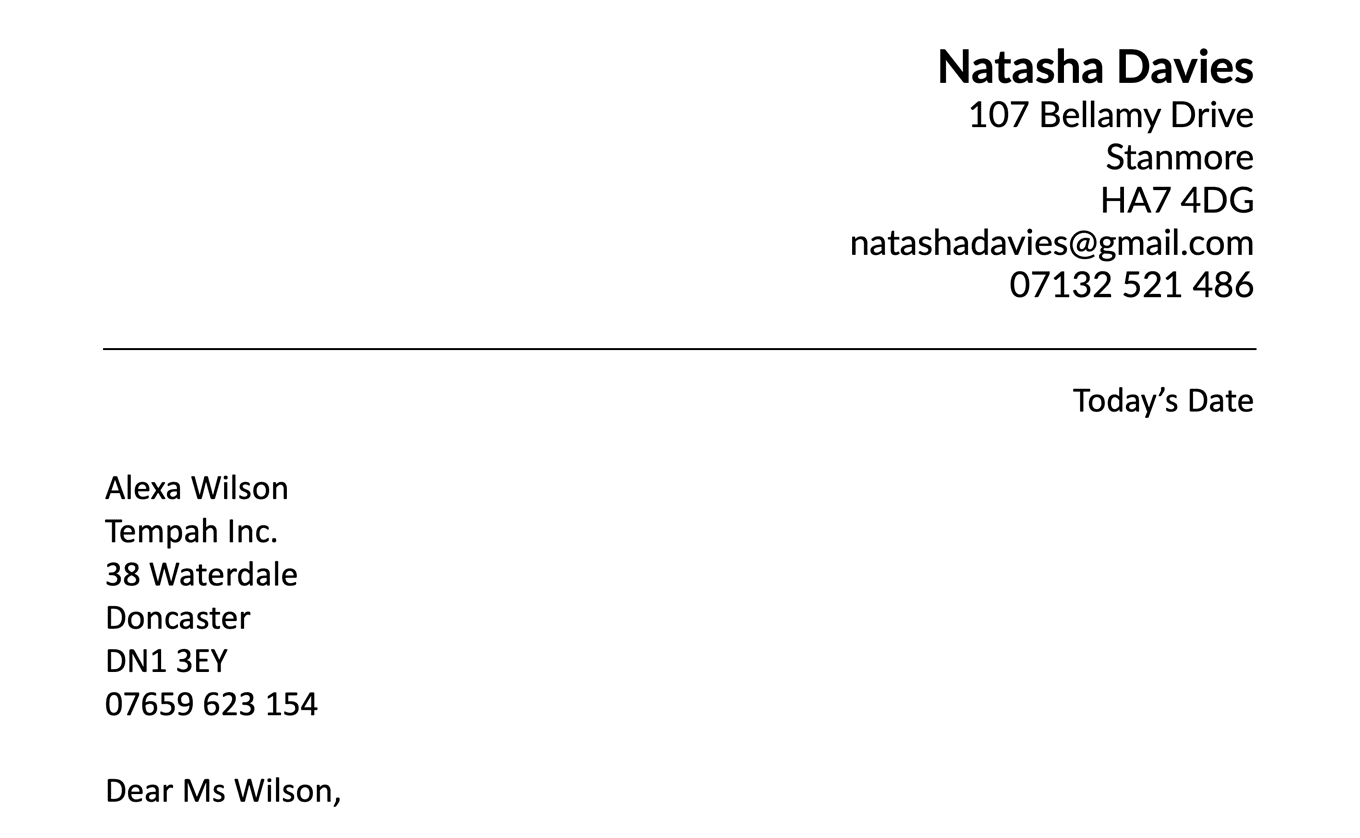
To see how cover letter formatting differs by industry, look at job-specific cover letter samples.
Use a preformatted cover letter template to save yourself time, so you can focus on the contents of your letter.
5. How do I address a cover letter to a recruitment agency?
Here’s how you address a cover letter to a recruitment agency —
- if you have a contact’s name: Dear [Mr/Ms/Mx][Contact’s Surname],
- if you don’t have a contact’s name: Dear Recruiter,
Whenever possible, use a contact’s name to make your cover letter more personable. You should be able to find a person to address your cover letter to by searching the agency’s website. But if not, contact the agency and ask who to address your cover letter to.
Reddit and Quora questions about addressing a cover letter
Many people take to online forums like Reddit and Quora in search of cover letter tips. Here are answers to two of the most relevant questions about addressing a cover letter:
1. How do I address a cover letter in the modern era
An anonymous Redditor posted this question. Here’s the answer from our experts:
Even in this modern era, you should use a formal greeting for your cover letter, following this format:
Dear [Mr/Ms/Mx] [Name],
But if you’re addressing your cover letter to someone you know (e.g., your friend is a manager at your target company and has encouraged you to apply for a role on their team), you can use ‘Hello’ in place of ‘Dear’ to be less formal.
2. I am currently writing a cover letter and I only have the first name of the hiring manager I am addressing it to. How should I address this letter?
This question was asked anonymously on Quora. Our experts offer this reply:
First, you should try to find the hiring manager’s last name and title by researching their company website and social media.
But if your search comes up empty, you can greet them by their first name, like so:
Dear James,
Don’t feel shy about using their first name. If that’s all you have, then it’s likely that’s how they prefer to be addressed.
